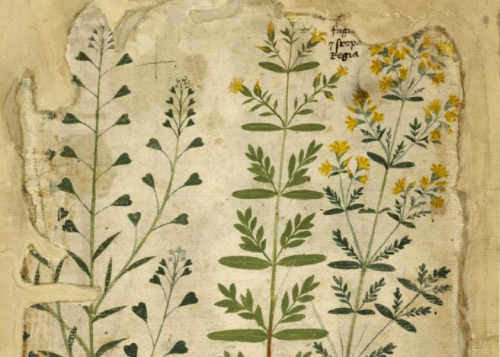*Note: Remember, Elephant is not your doctor or hospital. Our lawyers would say “this website is not designed to, and should not be construed to provide medical advice, professional diagnosis, opinion, or treatment to you or any other individual, and is not intended as a substitute for medical or professional care and treatment.” But we can’t afford lawyers, and you knew all that. ~ Ed
~
I think a fine indicator of wisdom is knowing how to tactfully inquire about the things one does not know.
A patient once asked me (long before COVID-19): “How do you reconcile prescribing all these Chinese herbs to people when the quality of Chinese products and manufacturers have such an awful reputation?”
It was a great question, though required only a simple response: “Traditional Chinese Medicine has nothing to do with modern Chinese business practices.”
This concept is easy to grasp but difficult to accept for many Americans who fear the unknown and/or distrust non-Americans…or both. The herbal formulas we prescribe are based on a paradigm of medicine that was created in China over 2,500 years ago. The herbal formulas we use today are grown in California, Colorado, upstate New York, or Maryland and come as close to China as your French fries do to Paris.
From a Chinese medical perspective, COVID-19 requires different prescriptions, depending of course on the individual, the severity of presentation, and most importantly, what stage it most recently progressed to. For example, in the early stages of Coronavirus, we often use antitussive herbs that alleviate cough and clear heat and inflammation from the lungs. As it progresses deeper, we focus more on the muscle layer, tissues, and stomach, where the obstructive phlegm is originally formed. This virus is inherently cold and damp like the climate from which it comes (Wuhan), so we often turn to herbs that will warm the person’s immune system and encourage it to purge the toxins.
One of the most important principles of herbal medicine is that all diseases, like all people, are ever-changing, and so our prescriptions must logically follow suit.
More than half of my (acupuncture) patients do not accept Chinese herbs, which saddens me, as herbs are wonderful. They are scientifically studied, have been around forever—long before pharmaceuticals—and most of us without knowing have already been taking them for our entire lives.
First of all, everyone is aware of the scientifically evidenced benefits (or detriments) of particular foods, which obviously derive from the same source as herbs. Secondly, are the countless examples of herbal origins of pharmaceuticals.
The basis of aspirin is salicylic acid, which comes from white willow bark, which comes from Europe and China. Digoxin is made from foxglove root and is used by Western medicine to treat heart conditions. Foxglove is an extremely common herb in Chinese Medicine that addresses the heart, kidney, and liver channel, whose effects change based on how the herb is cooked and prepared. While wine-frying herbs has more of a blood-thinning effect, dry-frying them has a greater effect on digestion.
Another sad rationale certain patients cite for passing on herbal medicine is a naïveté around their chemical strength. “Turns out I have a virus,” they report. “I guess I’ll just have to go to the doctor.” Please don’t get me wrong: going to the doctor is always an advisable choice to be safe; however, there are countless herbs with antiviral properties, such as honeysuckle, kudzu, or isatis root, that should not be overlooked or underestimated, and do not damage the body like contemporary medications.
In the ancient Chinese medical texts, things like ginger and licorice are written about extensively, as are mushrooms, cinnamon, and recent fad supplements such as turmeric and astragalus. But there are thousands more potential herbal combinations to address all conditions that require extensive study to intelligently prescribe.
I have few greater pet peeves than when some Western doctor who reads a few studies tells everyone: “Ginger is good for digestion.” Then Cycloid B patient goes to a store like CVS, buys some third-rate company’s ginger supplement, and experiences no relief, temporary relief, or even an adverse reaction. Why?
(Herbal) medicine is complicated. Teachers of mine with twice my years of experience claim to have studied herbs for their entire careers and still not mastered them. Some people try herbs from one herbalist (who might suck) and then denounce the entire medicine if they don’t quickly get desired results. Can you imagine the Western equivalent to this? Does anyone renounce all of biomedicine after one bad experience? True healing of chronic conditions requires time, trial, and error, unfortunately none of which exist in abundance in modern society. But it is ignorant for people to group herbs (or acupuncture) in with things like gemstones, psychic healing, or yoga when none of these have anything to do with our formal education.
Most laypeople translate “holistic” as non-pharmaceutical and/or non-scientific, something vegan girls who attend astrology classes are into. This is an inaccurate stereotype unfortunately reinforced even by J.K. Rowling by making “Herbology” one of Harry’s first semester classes. Thanks a lot, J.K. Thousands of years of clinical evidence and countless modern studies and in one fell swoop we’ve been reduced to Witchcraft.
Herbal medicine is as scientific as any drug or food, and just because something is not a pharmaceutical does not make it “holistic.” As a matter of fact, even some pharmaceuticals can occasionally be used holistically. Holistic just means assessing individual patterns, not symptoms, and most adult individuals have multiple patterns atop one another. Their healing process requires a proverbial peeling of layers of an onion, not throwing a dart at the layer that happens to be aggravating them this week. This means knowing what to prescribe, what not to prescribe, and when to switch from one to the other based on patient feedback. There is not only one step in the process, nor any one-to-one correlation between symptom and prescription.
There can be many reasons for any one digestive condition. It can be a result of genetics, a hormonal imbalance, cortisol, poor diet or lifestyle, or a combination of several or any other litany of mechanisms. In Chinese Medicine, all of the organ channels are connected, so we say stomach issues may be a stomach problem, or may be a result of the kidneys, lungs, liver, or gallbladder. Also, every individual has their own constitution, which is primarily determined by whether they are warmer bodied (strong in yang), or cold bodied (stronger in yin).
Because ginger (or turmeric) has a very warm quality it could benefit the latter constitution, while someone of the former’s indigestion is more likely a result of excessive heat that might be aggravated by ginger. Finally, if the root cause of the condition is not the stomach, ginger will offer only temporarily relief.
Many patients inquire about using maca root to boost testosterone or sex drive because of recent articles or research. Nine times out of ten, herbs like maca with such warming qualities may offer these benefits temporarily. But if a man’s reduced hormones or libido are a result of a “heat pattern” (more common with men), in the long run this can cause more harm than good.
Many cases of hormone depletion are a result of a person not sleeping enough due to a hyperactive sympathetic nervous system or an excessive intake of alcohol. A more holistic, thoughtful approach would be the use of cooling formulas that reduce inflammation in the liver or stomach or calm the central nervous system. Surely, after 100 days of alcohol avoidance and/or better sleep, hormones will improve.
Another recently sexy herb is ashwagandha, from Ayurveda, which often gets prescribed based on symptoms in neglect of patient pattern or qualities of the ashwagandha herb. Is it warm, cool, bitter, acrid? Which organ channels does it target? If we cannot answer these questions then we are guilty of applying a holistic prescription to an allopathic diagnosis. While such laziness probably won’t do any more damage than would Western pharmaceuticals, it is equally unlikely to cure anything.
Similarly, substances like CBD or marijuana are fine alternatives to painkiller medications, but how they are being used today would not qualify as “holistic.”
Finally, real herbalists almost never prescribe single herbs alone, any more than one chemical is ever used to create a pharmaceutical. Compounds work synergistically, so it always raises an eyebrow when some “holistic doctor” suggests someone take one herb.
If a practitioner prescribes ginger for digestion, turmeric for inflammation, or astragalus to boost your immune system without first speaking with you to determine your pattern, they are not practicing holistic medicine. They might be able to cite scientific research or studies, but one should be cautious of the mindless worship at the throne of “studies.” Scientific studies are difficult to control and rarely consider underlying mechanisms set into motion in the body beyond short-term benefit.
I’ve had a few patients pause at taking herbs, citing a concern for their ignorance of the ingredients. “I like to know what I’m taking,” they profess, as if they (or even their doctor) know the entire chemical composition of the medications they take. Can any of us cite all of the compounds that compose ibuprofen? These patients are confusing their desire for familiarity for an insistence on knowledge. They don’t actually need to know what they’re taking so long as it’s something the majority of society or their social circle has partaken in.
I recommend to patients courage, trust, and an open mind, as these are all ingredients to happiness, which means they must also be to healthiness.
~











Read 2 comments and reply